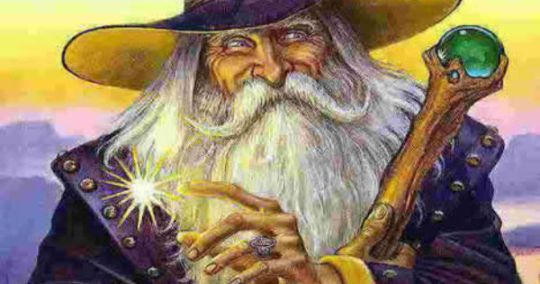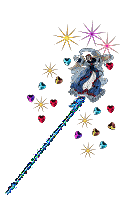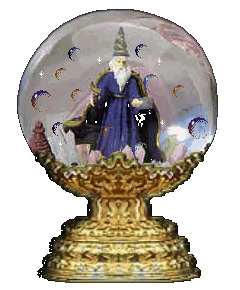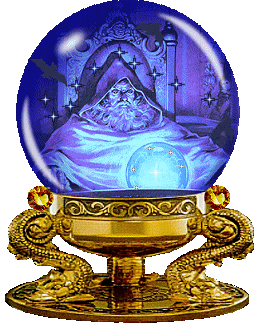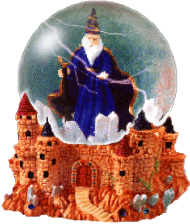Etymological development of "wizard"
- *weid- : Proto-Indo-European "to see"
- *wissaz : Proto-Germanic reconstruction of past-participle adjective of *weid
- *wys : Middle English "wise"
- -ard : from German -hard/-hart, used as an intensifier, and used in Middle High German as a specified condition with pejorative connotations (e.g. "coward"--"one who lacks courage"; "blaffard"--"one who stammers")
- *wisard : early 15c. "philosopher, sage, person possessing great wisdom"
...and as Etymonline says, "often with a suggestion of use for evil ends", or as Oxford English Dictionary puts it, "often disparaging with implications of falseness or pretence". thus the pejorative -ard.
From weid we learn that we are seers. Our magic comes not from power, riches, or deals with devils. Neither is it an inherited ability, or rather it is inherited simply from being human. Magic comes from Seeing--from perceiving and reflecting, discerning and deducing, learning and unlearning and relearning, knowing and not-knowing again and again. It comes from seeing what's there, what's not there, what should be there but isn't and what shouldn't be there but is. Wizards are those who understand that magic comes from observation and devote themselves to finding and finding and finding such magic.
From the development of the term into wys-ard we See how we play with the magic of Seeing. The suffix shows that we are the original wise guys and smart alecks (a distinction I personally hold with pride as a sarcastic child of the 90s). Wys-ards are masters at subverting expectations, evident in our wys-ard language and interaction with the everyday. We prance in the fields of paradox and irony to call attention, to form a shield, to laugh at society, to laugh at ourselves, or simply for no other reason than to exercise our wits. It disrupts dominant way of interacting with the world in the hopes that it will encourage the continuance of Seeing. And it also serves as a powerful means of survival in the face of a society that refuses to See. Call us tricksters, call us punks, call us what you may, if there is one thing a wys-ard lacks not it is self-esteem.
And from the term wisard and suggestions of evil that come with it, we See how society attempts to expel (ex-spell) Seeing from itself. Society does not want to See, for that would mean accepting the inherent capacity for magic in all humans, unlearning what it tried so hard to establish, and through accepting the possibility of not-knowing, admitting that it is flawed for it is not omnipotent. Society cannot accept that it may be evil itself, so it must be those who See it which are the evil ones. Society must (especially that of the 15th century from which our name wisard came) characterize acts--and people--that go against its norms as "evil".
Yet if we have Seen the outcome of those norms and the society that has borne them, should we not be proud to be declared evil? Consider acts of treason--if a society is unjust, would treason not be a true good? The punishment of treason is used not to promote good, but to promote loyalty above concepts of good and evil. When working-class necromancers create potions to dethrone corrupt kings, when peasants protesting their poor treatment are fired upon by the personal knights of the ruling tyrant, it is the disempowered who are called evil. When the ruling class destroy the lives of thousands--millions--for personal gain, they are called leaders. I say--if they call us evil for Seeing what is real, we shall proudly wear the title!
And now to our title of wizard today. In addition to retaining its association with magic--which of course it must, it is in part a statement on the meaning of "magic" as Seeing--the word is now given with honor to those seen as having exceptional skills beyond understanding. I wonder if this is in some ways a ploy serving society's interests in a more subtle way through fostering a separation of sorts, the idea of Genius as being something born rather than facilitated (or not) by society in some and not others. I sincerely hope that it is still known that anyone may become a wizard, because to become a wizard is simply to commit to Seeing.
